Archived Storm Damage Blog Posts
Winter Storm – Are you Prepared?
1/8/2025 (Permalink)
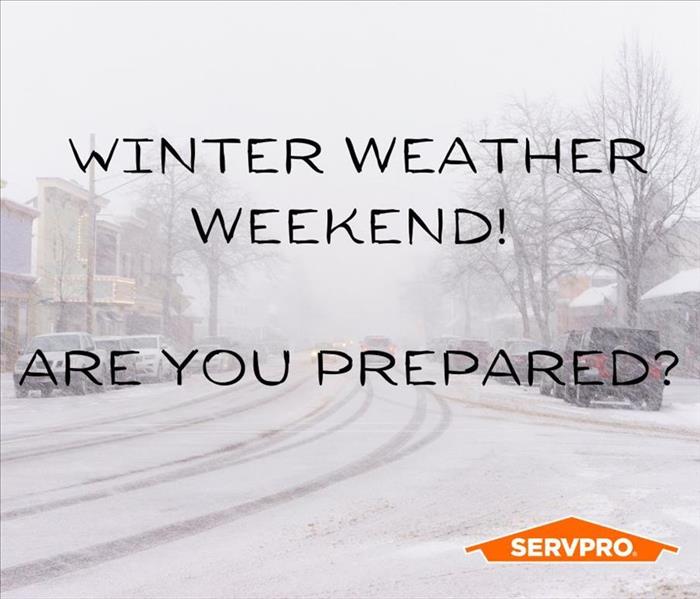 A blanket of snow covering the roadways.
A blanket of snow covering the roadways.
We seldom see the forecast of “Snow” in the South, but predictions of a winter storm has been determined for the upcoming weekend. Now is the time to prepare. If we learned anything from Hurricane Helene, it was to be prepared. The most requested items are bread and milk – but there are far more important items needed to prepare for a winter storm. Storms in the south are usually followed by ice, which means a power outage is most likely going to play a factor in these storms so be prepared!
Gather your emergency supplies:
- Food and water
- First aid kit
- Fill your vehicles with a full tank of Gas (this is especially important should you lose power and need to stay warm).
- Flashlight and extra batteries and cell phone chargers
- Have extra blankets and warm clothing.
- Another heat source, kerosene heater, hand warmers, firewood if you have a fireplace.
Avoid travel and stay tuned to your local weather stations for updates on current weather situations.
Hurricane Preparedness – Were You Ready?
10/10/2024 (Permalink)
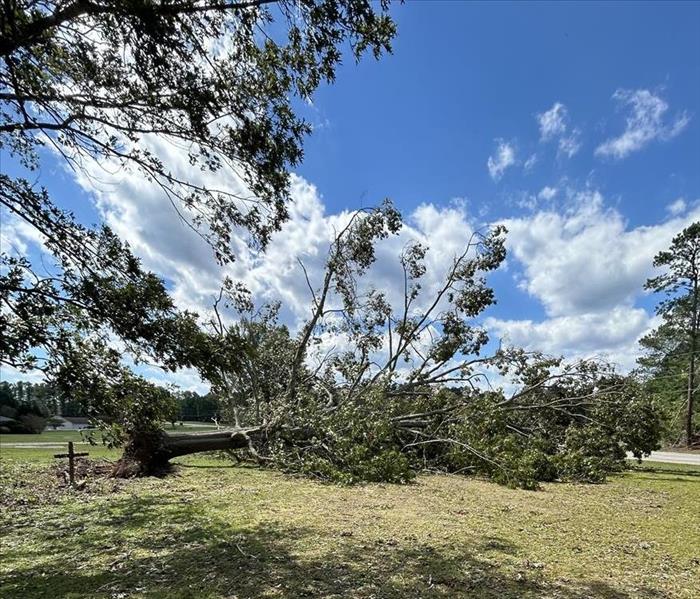 Downed tress after Hurricane Helene in Laurens, SC
Downed tress after Hurricane Helene in Laurens, SC
Hurricane Helene made its way through our area and left a path of destruction from Florida to Tennessee. Bringing hurricane strength winds, rain, and flooding across Five States. The destruction is without a doubt the worst anyone has ever experienced in our area. This does not happen here, not in the mountains! But it did – the questions is, how prepared were you? Can anyone prepare for this, maybe not, but I am certain we are all looking back and thinking what could I have done to be more prepared?
With the amount downed trees and powerlines that we all experienced during this Hurricane the length of time for power restoration was the most problematic hardship for most families.
Going without electricity for several days can take its toll on anyone. Loss of AC, loss of water if you have a well that runs on electricity and food you had purchased prior to the storm can become a major loss for everyone.
I think we can all learn from this experience and be better prepared for the next Hurricane or severe storm when it hits our area, and rest assured, it will.
SERVPRO of Newberry and Laurens Counties is here for every storm, no matter the damage you can count on us to see you through.
Tropical Storm Helene
9/24/2024 (Permalink)
 Preparing for Tropical Storm Helene
Preparing for Tropical Storm Helene
Tropical Storm Preparedness
The month of September has been dedicated to Preparedness – and now we find ourselves in this very predicament of being prepared. Tropical Storm Helene is predicted to make landfall on the coast of Florida and move its way inland to our area in the next 48 hours. Heavy rains, high winds and localized flooding are evident.
Prepare now in the event of severe weather:
- Check your emergency kit.
- Have a bottled water supply to last you for 3 or more days and non-perishable food items available.
- Prepare your home - check your gutters and make sure your down spouts are clear of debris. Secure any outdoor furniture.
- Check any trees and cut back any dead limbs that could cause damage to your home.
- Stay tuned to your local weather forecast and the potential for severe weather.
- Power outages are evident – if your home is reliant on a generator, make sure you have an ample supply of gas to see you through the storm.
Stay safe and being prepared is your best defense. If you do experience damage, know that SERVPRO of Newberry and Laurens Counties is here for you!
Hurricane Season is here!
7/11/2024 (Permalink)
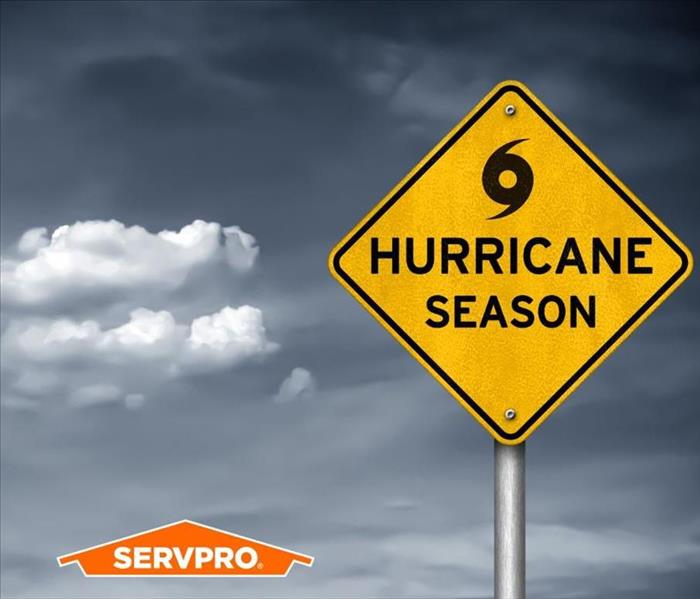 Hurricane Season Sign
Hurricane Season Sign
Hurricane Season is here!
The hurricane season has officially begun, with Hurricane Beryl wreaking havoc across the Atlantic.
This is an extremely early occurrence for a major category 5 hurricane to hit this early in the season, but the National Oceanic and Atmospheric Administration (NOAA) is predicting an above-normal hurricane season. The month of May is declared National Hurricane Preparedness month. Families are encouraged to start planning for the season early. So, if you have yet to have a plan – the time is now!
- Have a plan to evacuate – especially if you live near the coast.
- Have your shelter plan in place and be ready to live without water – electricity, gas and phone service for a while.
- Stay connected – sign up for emergency alerts and monitor local weather.
- Gather emergency supplies – water- non-perishable food- daily medication – batteries and have a full tank of gas in your vehicle prior to a hurricane warning.
- Secure your home by covering windows, removing patio and outside furniture toys.
The season is just beginning so making sure your family is prepared will be your first line of defense assuring your safety.
May is Storm Month – Hurricane Preparedness
5/6/2024 (Permalink)
 Now is the time to prepare for Hurricane Season
Now is the time to prepare for Hurricane Season
As we all start to gear up for the summertime season – it is also time to prepare for Hurricane Season. May 5 – 11 is National Hurricane Preparedness week. Experts are predicting an “Extremely Active” season – So now is the time to prepare!
- Create an evacuation plan – our area may not be in the direct path of a hurricane, but it is still a good idea to have an evacuation plan especially if you have children in school. Review your plans with your family members and don’t forget your fur babies.
- Build an emergency kit – Water – non-perishable food, battery powered radio and additional batteries. Flashlight and cell phone chargers along with additional charging stations in the evert you do not have power for an extended period of time. It is always a good idea to keep some cash on hand.
- Stay Informed – Follow local news stations on social media and sign up for weather alerts in your area.
Gutters and Pollen
4/4/2024 (Permalink)
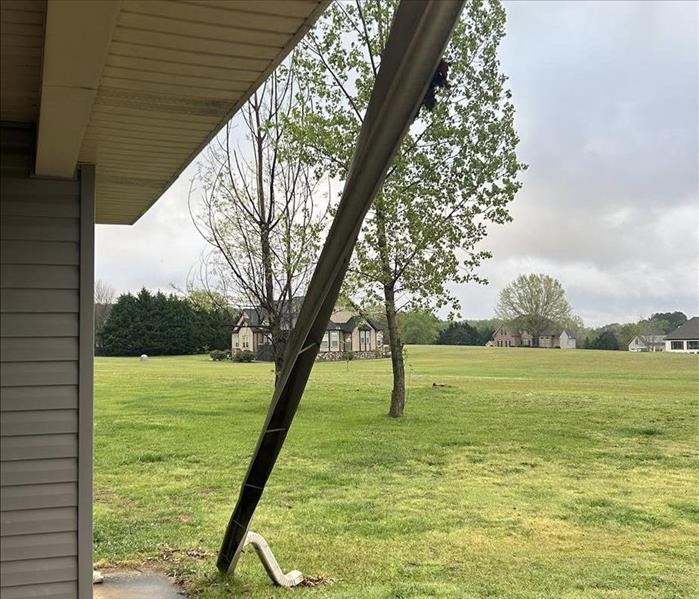 Debris filled gutter and high winds caused the gutters to be pulled from this home.
Debris filled gutter and high winds caused the gutters to be pulled from this home.
Spring has arrived and so has the yellow powder of pollen that has covered our area in a very short time. The trees and shrubs are blooming, and we are all getting geared up for warmer weather. March and April are very unpredictable months. Rainfall and high winds are expected during this time of year. Be sure you are checking your gutters regularly- leftover debris from winter along with the yellowish-beige , wormlike danglers called catkins are sure to fill up your gutters and cover the ground causing your gutters to fill and up become clogged and with rainfall and strong winds can cause damage to your gutter system. If your gutters get filled with catkins, it can cause water damage to your roof structure, rot the fascia board or even damage your gutters all together.
Don’t let your gutters end up like this home in Laurens, SC. High winds and clogged gutters made its mark on this homeowner.
Happy Spring!
Hurricane Hugo - Do you remember?
9/26/2023 (Permalink)
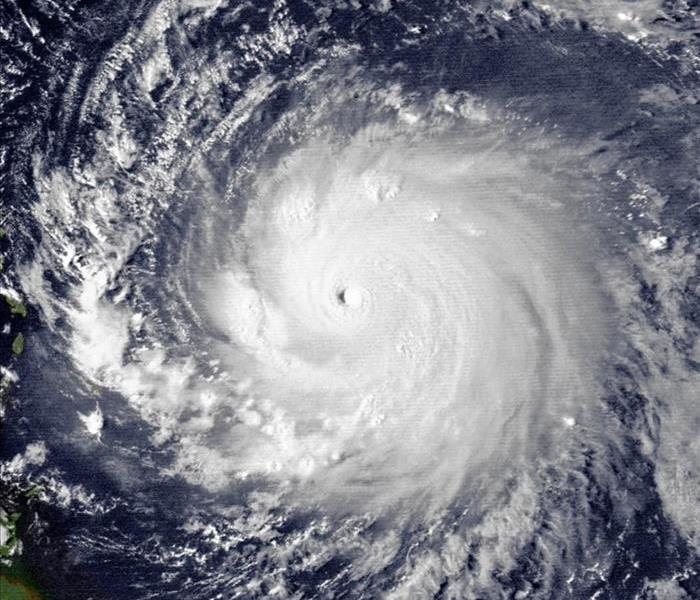 Hurricane Hugo over the Atlantic Ocean heading for the cost of South Carolina.
Hurricane Hugo over the Atlantic Ocean heading for the cost of South Carolina.
During the month of September, we have been alerting our residents to be prepared for an emergency. September has been identified as National Preparedness Month – a reminder to prepare for the potential of severe weather - let us all be reminded of Hurricane Hugo. Hurricane Hugo was a powerful Cape Verde tropical cyclone that inflicted widespread damage across the northeastern Caribbean and the Southeastern United States in September 1989. South Carolina was a direct hit of this Category 5 Hurricane. The scale of Hurricane Hugo impacts led to the retirement of the name Hugo from any Atlantic hurricane names.
Hugo was the strongest hurricane to make landfall in the continental US since Hurricane Cammille in 1969. Hugo set records across South Carolina and the storm surge heights and winds brought extensive damage to South Carolina. Forests were impacted between South Carolina into Virginia.
Hurricane Hugo left its mark on South Carolina and the barrier islands of the coast. Many people were not prepared for such an event. We encourage everyone to have a plan and be prepared for severe weather – Hurricane season is far from over – but our hope is that we never experience the devastation Hugo left in its path.
Tropical Storms - Be Prepared
6/21/2023 (Permalink)
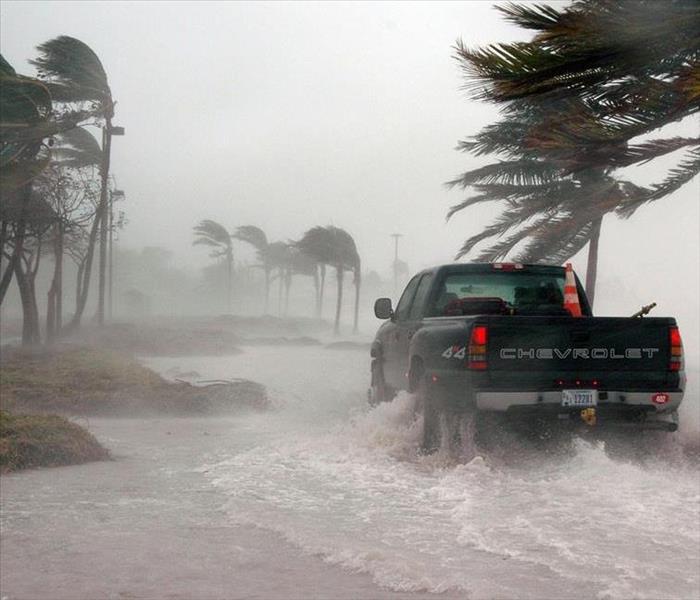 Vehicle driving during a coastal storm
Vehicle driving during a coastal storm
As we have entered the Hurricane season – mother nature has sure shown us she is unpredictable. Our area has been drenched with heavy rainfall – cooler temperatures and flash flooding for several weeks now. Some may wonder, will summer ever actually arrive and stay? Being prepared for hurricane season should not be taken lightly. Make sure everyone in your household knows and understands your hurricane plan and your evacuation route in the event a Hurricane is predicted in your area. Follow your local weather stations for up-to-date information on potential storms that are predicted in your area.
Prepare for power outages. Keep a supply of batteries, candles, drinking water and non-perishable food items in the event your power is out for more than a few hours. Pick up a few items on each grocery trip because we all know the demand for these supplies can and will become an issue in the event a storm is predicted in your area.
Hurricane Preparedness
5/3/2023 (Permalink)
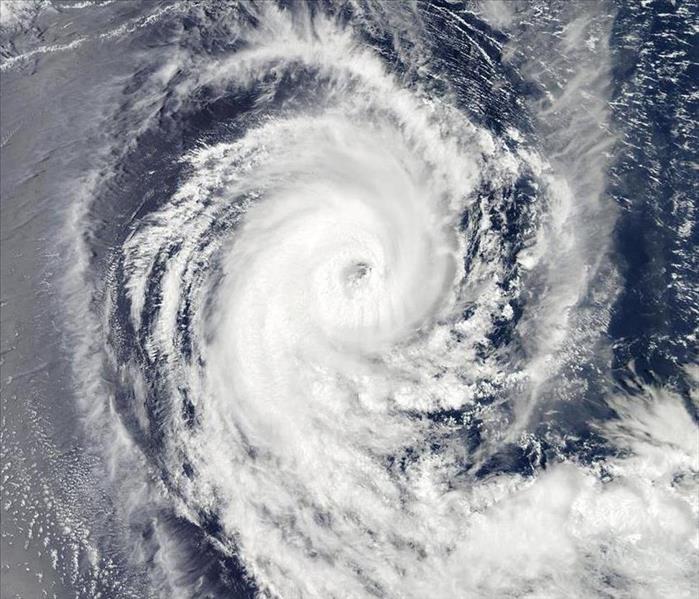 Satellite image of a hurricane off the coast preparing for landfall
Satellite image of a hurricane off the coast preparing for landfall
May flowers may be beginning to bloom but so is Hurricane Season – National Hurricane Preparedness kicked off this week to remind everyone to be ready for hurricane season. When taking action NOW you and your home and business will be better prepared for when the unthinkable happens. Follow these simple but effective guidelines to assure you have a plan in place.
Day 1 – Know Your Risk: Wind and Water
Day 2 – Prepare Before Hurricane Season
Day 3 - Understand Forecast Information
Day 4 – Get Moving When a Storm Threatens
Day 5 – Stay Protected During Storms
Day 6 – Use Caution After Storms
Day 7 – Take Action Today
Follow us on social media for more information on how to prepare your home – family and business when hurricane season has arrived!
Prepare for Hurricane Ian
9/28/2022 (Permalink)
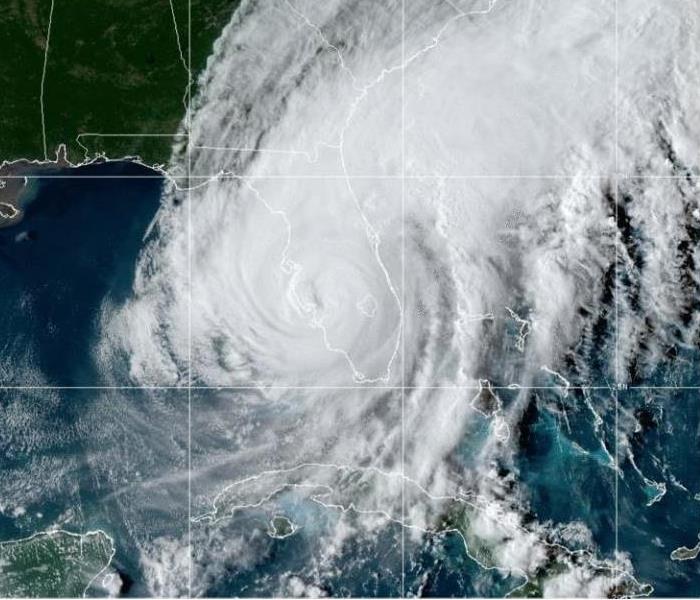 Satellite image of Hurricane Ian off the coast of Flordia
Satellite image of Hurricane Ian off the coast of Flordia
Hurricane Ian is making its mark on the Florida coast and its path is headed right towards the upstate with heavy rain and winds. Preparing for this storm is key to riding it out without any major damage to your property.
- Secure all patio furniture, grills and accessories that could be easily moved with high winds
- Set up weather alerts on your phone or email
- Have water and non-perishable food on hand in the event of a power outage
- The leaves have started to fall so assure your gutters are free of debris so water can flow freely to avoid potential water damage
- Have some cash on hand – with a power outage the ATM may be down
Keeping update to date with local news and weather channels can prepare you for the storm ahead. We are keeping Florida and all those who are the path of Hurricane Ina in our thoughts and prayers.
Hurricane Season
9/13/2022 (Permalink)
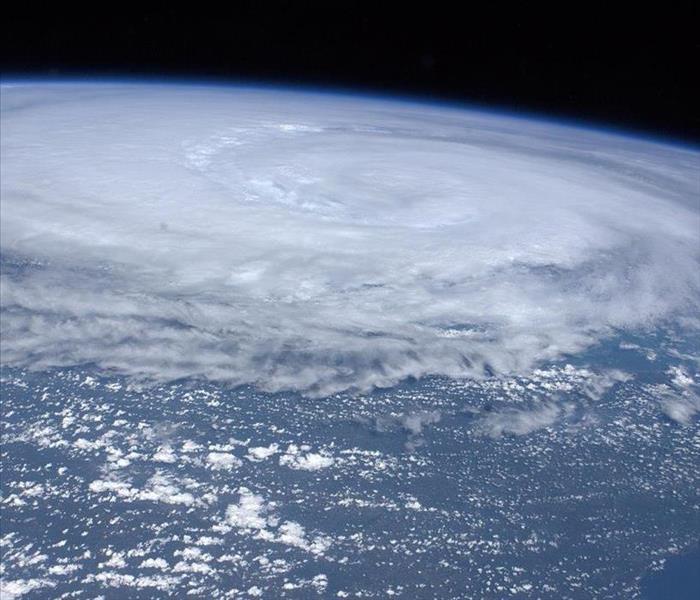 Satellite image of a Hurricane over the Atlantic
Satellite image of a Hurricane over the Atlantic
Hurricane season officially kicked off June 1st – and so far, we have had a calm season this year. But don’t let your guard down just yet! We have just entered the peak season, so the potential for a severe hurricane is still possible.
Review the plan with your family and plan accordingly as we often forget the plan that you put in place a few months ago. Follow your local new sources and local government officials. Confirm the location of shelters near-by in the event a hurricane should hit.
Check your battery stash and non-perishable emergency supplies. Always make sure you have at least a month’s supply of your daily medication. Keep some cash on hand – remember if the power is out – local stores cannot swipe the debit card that we have grown accustomed too.
We are almost out of the hurricane woods, but until then stay safe and know you can count on SERVPRO of Newberry and Laurens Counties to be there for you!
Hurricane Season
7/28/2022 (Permalink)
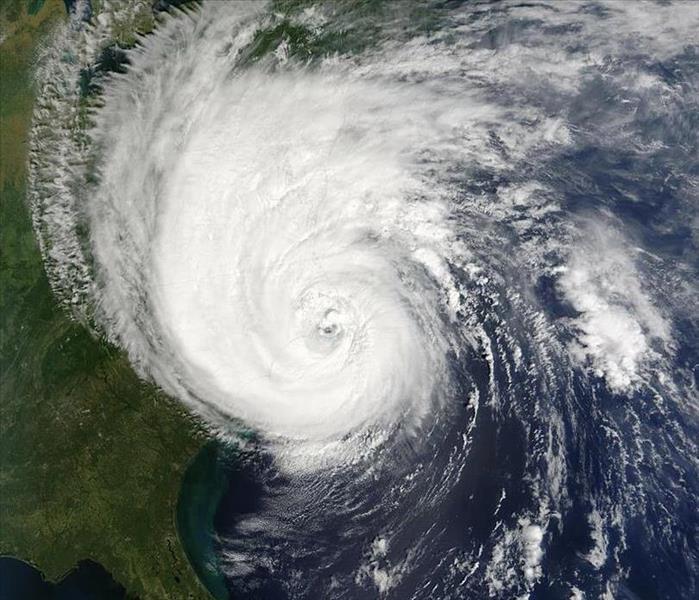 Satellite over the Atlantic Ocean
Satellite over the Atlantic Ocean
Excessive Heat can fuel severe storms at any time. Our area has experienced extreme temperatures over the past few weeks, and we need to remember hurricane season is in the active state until November so don’t let your guard down just yet. Although hurricane season hasn’t been as active as predicted this season we still need to be prepared and not just on the coast. Rain, wind, and tornadoes can happen extremely far inland where a hurricane or tropical storm makes landfall. Review your emergency plan and make sure your family knows and understands your plan. Always follow your local weather stations as they can provide you the recommendations based on the threat of your community first. Most importantly keep our family safe and know you can count on SERVPRO of Newberry and Laurens Counties to be there if you need us!
Summer Storms
7/7/2022 (Permalink)
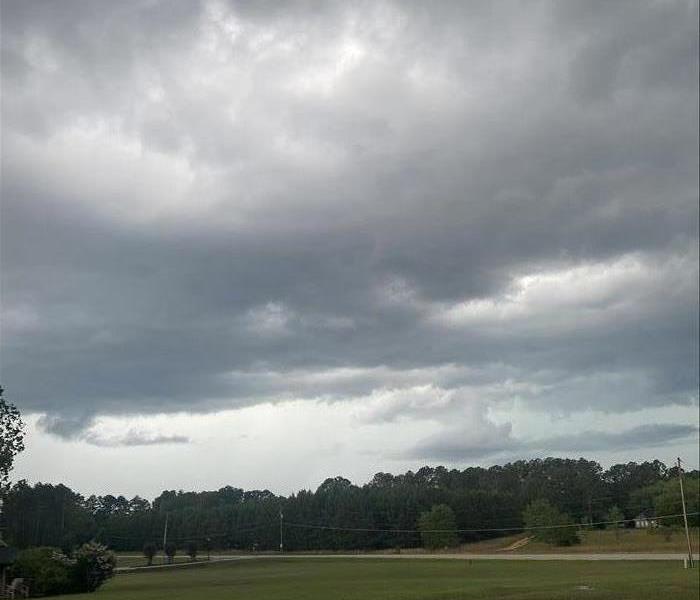 Storm moving in over Laurens, SC
Storm moving in over Laurens, SC
The extreme heat over the past couple of weeks are not only taking its toll on our yards and flowers dry conditions and warmer temperatures are the perfect mixture to create a severe thunderstorm. Summertime thunderstorms can come out of know where and sometimes with very little warning but there are a few things you can do to prepare yourself and your family when one hits.
- Activate weather alerts on your smartphones
- Keep your eye on the sky and check radar on weather apps
- Stay inside your home and if your traveling in your vehicle find a safe place to park to ride out the storm
- Stay out of the water when a storm is approaching, or you see lightening
- Do not shower or wash dishes during a storm
- Stay away from windows and glass doorways as lightening has no boundaries
Preparing for Hurricane Season
6/1/2022 (Permalink)
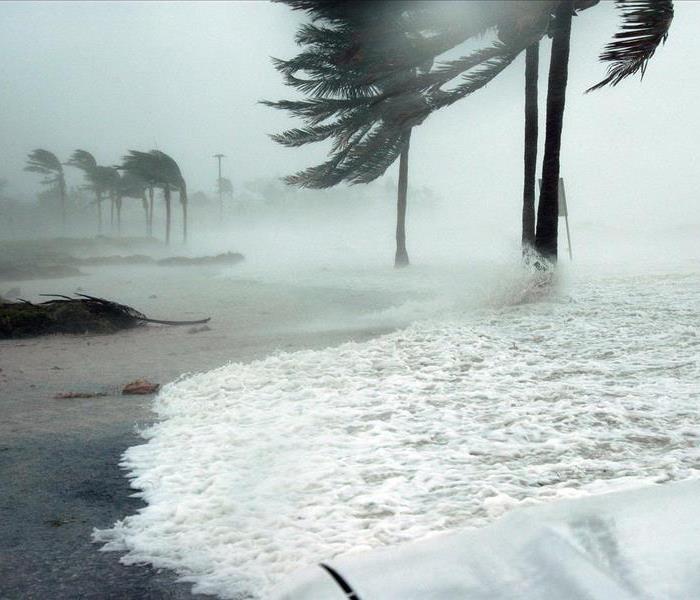 High winds with a Huricane hitting the coast with a storm surge.
High winds with a Huricane hitting the coast with a storm surge.
Hurricane season officially begins today, June 1 and ends November 30. The National Oceanic and Atmospheric Administration (NOAA) is predicting an above average hurricane season this year. This number continues to increase from year to year, so being prepared is your first line of defense. Most power companies have a comprehensive storm response plan and so should you! There is only so much your local power company can do to help prevent outages. These companies are strengthening their grid, installing stronger poles, and upgrading wires, trimming trees, and placing outage-prone lines underground. But this doesn’t keep the power from going out. We must prepare for days even weeks of a power outage, especially if you live near the coast and in a hurricane prone area. Have an emergency kit ready – a portable radio – purchase portable chargers – being prepared and informed should be at the top of your list!
Spring Storms - Know the Warnings
4/4/2022 (Permalink)
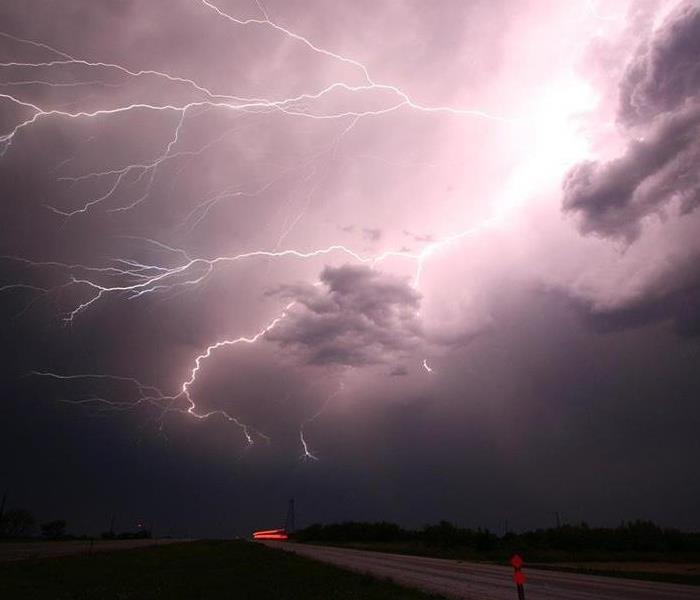 Severe lightening and storm on the horizon.
Severe lightening and storm on the horizon.
As we finally say good-bye to windy March – and boy was it a dozy – we can now look forward to April. But with April comes rain and storms. With the temperatures steadily rising the chance of a freeze is highly unlikely but possible. Spring storm will at most come out of nowhere so being prepared is key to spring storms. Local weather experts are predicting a possible severe weather event over the next 47 hours. Heavy rain will move in mid-day with severe threats moving in on Wednesday. Have a plan in place and be ready to take action.
- Design a safe room – basement – storm cellar or the lowest level of your home.
- Secure or store outdoor items
- Flashlights and batteries are essential in the event of a power outage.
- Charge your cell phone and make sure your car is full of gas.
- Keep important insurance information handy in case you need it.
Follow your local new source for up-to-date information on weather situations and pay close attention to their warnings. SERVPRO of Newberry and Laurens Counties is here for you!
Spring Storms
3/9/2022 (Permalink)
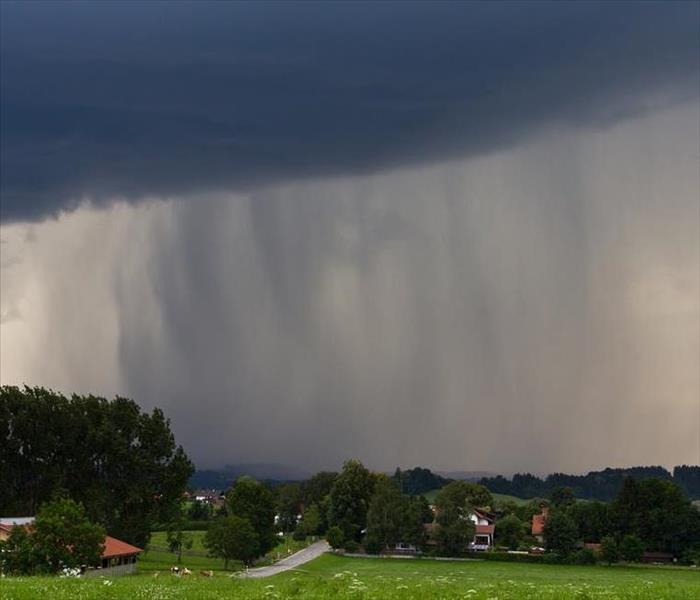 Spring Storm coming into a Residential area.
Spring Storm coming into a Residential area.
We are now entering the month of March – when mother nature can throw just about anything weather wise our way and we may or may not have a warning! March came in like a sweet lamb but that has changed over the past 24 hours with heavy rain – storms and lightening. Knowing the difference between a storm warning and a storm watch can help you prepare for the threat of a severe storm that may impact your area. A Severe Storm Watch simply means to be prepared that a possible severe storm is probable, and you need to be prepared early. A Severe Storm Warning simply means take action that a storm has been confirmed and could indicate an imminent danger to life or your property. Stay safe and know that SERVPRO of Newberry and Laurens Counties is here if you need us!
Storms in the South
2/3/2022 (Permalink)
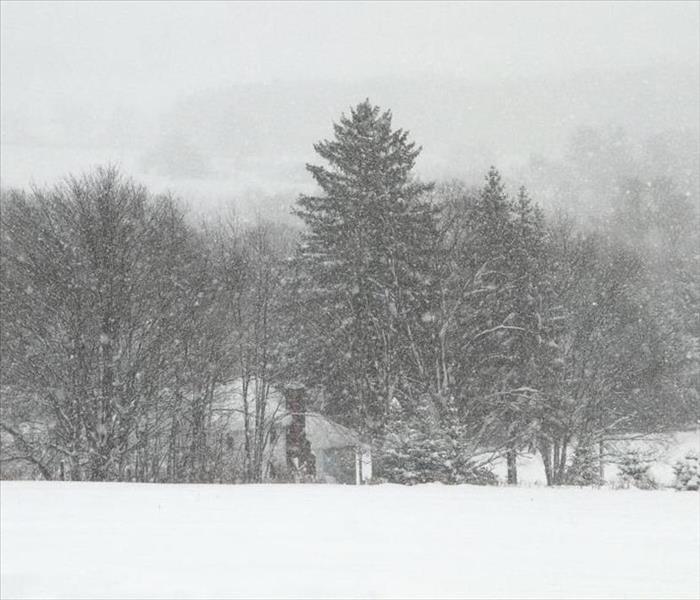 Snow covered yard after a winter storm.
Snow covered yard after a winter storm.
For those of us in the south we count on traditionally mild winters. Houses are often built on slab foundations and frequently have water pipes running through the attic, an especially vulnerable location.
Southern homeowners should be aware that pipes in attics, crawl spaces and outside walls are all subject to freezing and bursting. If these pipes don’t have insulation or heat to protect them, a strong overnight freeze can cause trouble.
Homeowners in the south need to be alert to the damages of freezing and bursting water pipes when the outdoor temperature threatens to drop to 20 degrees Fahrenheit. Although 20 degrees Fahrenheit is well below the freezing temperature of water, two factors make this the critical outdoor temperature:
- The temperature of an unheated portion of a house is almost always at least a few degrees above the outdoor temperature.
For example, an insulated attic may be at 37 degrees or 38 degrees Fahrenheit when the outdoor temperature is 32 degrees Fahrenheit.
- Water “supercools” several degrees below freezing before any ice begins to form.
In research tests at the University of Illinois, water pipes placed in an unheated, insulated attic consistently started forming ice when the outdoor temperature dipped just below 20 degrees Fahrenheit.
The 20 degrees Fahrenheit threshold is primarily for homes in the south and other areas where freezing may occur only once or twice a season. No matter what the weather may bring – SERVPRO of Newberry and Laurens Counties is here for you!
Winter Storms and Travel
1/24/2022 (Permalink)
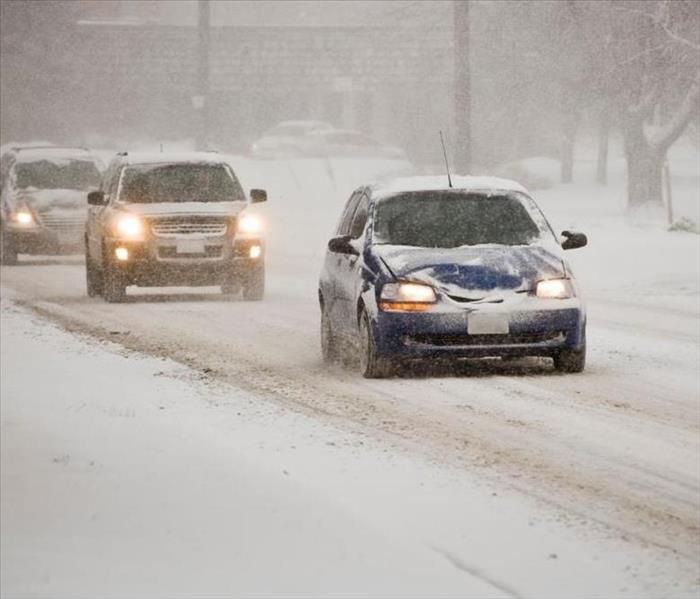 Traveling during a winter storm.
Traveling during a winter storm.
We have all experienced not one but two winter storm events over the past 10 days making us realize that winter is officially here to stay for at least the next couple of months. Hopefully you were prepared at home and if you had to travel during these events. If not, you still have time because winter is far from over. We take the necessary precautions when it comes to our home but what about your vehicle? Not all of us have the luxury of staying home when the winter weather hits so make sure your vehicle is equipped to handle driving in winter storm events. Make sure your tires are properly inflated and have enough tread to be able to maneuver through snowy and slushy roads. Check your tires often during colder weather. Keep at least a half a tank of fuel in your vehicle during the winter months – being stranded on the highway is bad enough - but running out of gas can be a nightmare in itself! Keep blankets – snacks, water, and a cell phone charger in your car prior to a winter event. The weather can change quickly – stay informed with local weather alerts and your local Department of Transportation. If you don’t have to travel, then stay home and enjoy the winter wonderland with your family.
Black Ice after the Storms
1/17/2022 (Permalink)
 Open road covered in Black ice
Open road covered in Black ice
The Snow has moved out of our area and as beautiful as it was, we are all anxious to get out and about when the sun came shining through this morning. Temperatures did not get out of the freezing zone today but with the warmth of the sun the roads were cleared of snow and began to dry out - but don’t take your guard down when driving. Black ice sometimes called clear ice can be a major driving factor after a snowstorm. Black ice is a thin coating of glaze ice on roadways and is visually transparent. It can blend in with any surface and it can cause dangerous driving conditions because it can be hard to detect on the roadway. Black ice forms most commonly at night or in the early morning hours when temperatures are at their lowest. Black ice can also be detected during the day when the roadway is covered with trees and has less sunshine and on bridges and overpasses. Take extra caution and allow yourself extra time when driving.
Extreme Heat is on the way to South Carolina!
7/27/2021 (Permalink)
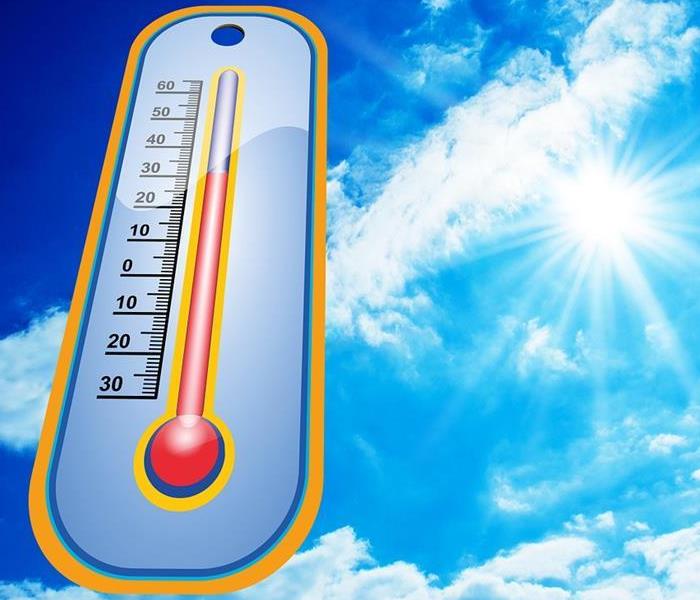 The sun is shining and the tempurature is rising1
The sun is shining and the tempurature is rising1
Throughout the past several days we have seen extreme storms pop up all around our area. Some of these storms have been extreme with the level of lightening causing house fires and significant damage in many neighborhoods. These storms can come out of nowhere so be prepared. So far, we have had a mild summer compared to previous years – but that’s about to change. These strong storms are bringing in the heat and taking us into 3-digit levels at weeks end. Follow all safety precautions when the temperature gets too high. More than 700 people die from extreme heat every year in the United States. Take all necessary measures to keep cool by staying hydrated and drinking plenty of water. Limit outdoor activities and chores especially during the midday hours when the sun is at its hottest! We are now entering the Dog Days of Summer – stay safe and stay cool!
Storms Bring Power Outages – Be Prepared
7/13/2021 (Permalink)
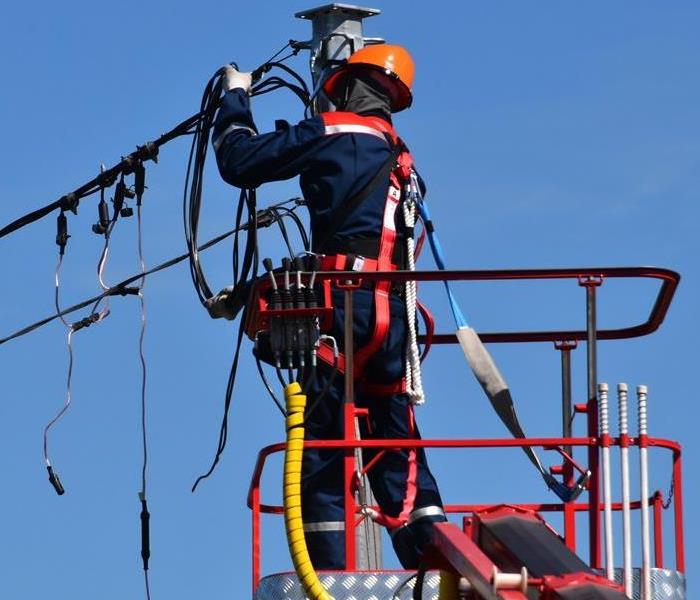 Lineman working on power lines after a storm and power outage.
Lineman working on power lines after a storm and power outage.
Summertime thunderstorms can come out of know where and sometimes with very little warning but there are a few things you can do to prepare yourself and your family when a storm hits, and you are without power. Having a preparation kit on hand with the essentials is key to riding the storm out and not being in the dark. There is nothing worse than looking around for candles and flashlights when the power goes out. Keep a box of supplies that are easy to reach when you suddenly find yourself in the dark. Keep your cell phone charged as much as possible so you can stay in tune with local alerts and sign up for text alerts from your power company if this option is available in your area. This will help you plan for your power to be restored. Being prepared is key to making a power outage less stressful.
Storm Damage in Laurens, SC
3/25/2021 (Permalink)
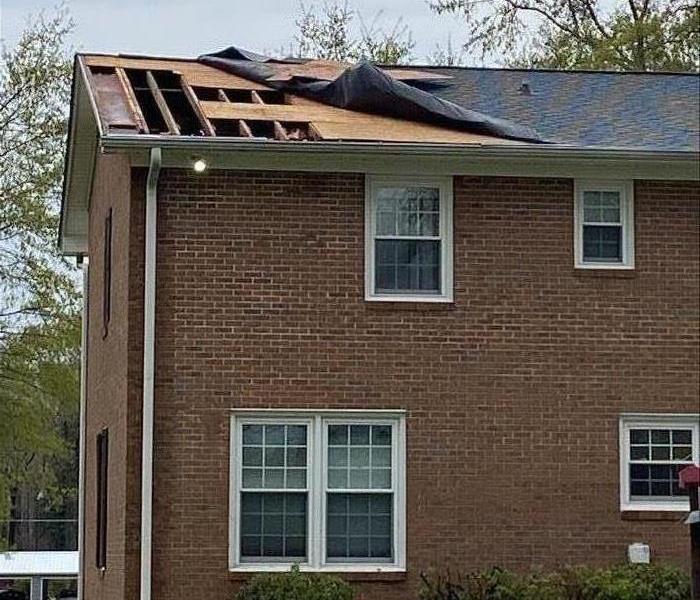 Severe storm damage to a roof in Laurens SC
Severe storm damage to a roof in Laurens SC
March came in like a lamb and so far, it’s leaving out like a lion! We are all too familiar with the spring storms of March here in the south and most of our region got hammered this afternoon during prime commuting hours! Several storm, tornado warnings and watches were happening all over the area this afternoon and several communities got hit hard with only a few minutes notice. Being prepared is always the best form of protection when Spring Storms are predicted. Secure as much of the outside of your home as quickly as possible and make sure your family knows the “safe” area of your home. Stay away from windows and doors and download the local weather apps on your phone to assure you are up to date on current weather situations. Chances are during severe weather your cable or satellite TV will lose signal so have a backup plan to follow the current storms happening in your area. If you should experience storm damage to your home –contact SERVPRO of Newberry and Laurens Counties. We are here for you – before and after the storm!
Be Preapred for Severe Weather
3/17/2021 (Permalink)
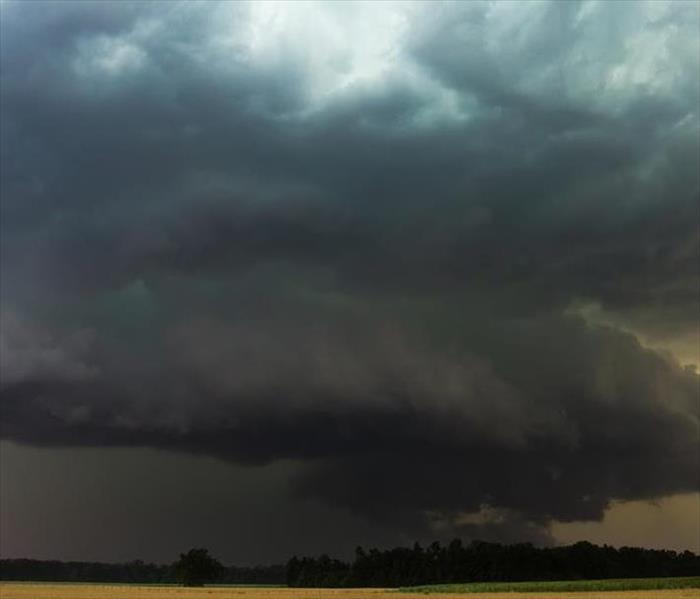 A severe storm is brewing
A severe storm is brewing
Spring is just a few days away and we are already preparing for our first Severe Weather Event for much of the South over the next 24 hours. There is a high risk of strong storms, tornadoes and extreme high winds for most of the viewing area. Hopefully, you have your preparedness plan ready to spring in action.
- Design a safe room – basement – storm cellar or the lowest level of your home.
- Secure or store outdoor items
- Make sure you have ample water, food and any medications.
- Have a first aid kit on hand.
- Flashlights and batteries are essential in the event of a power outage.
- Charge your cell phone and make sure your car is full of gas.
- Keep important insurance information handy in case you need it.
Follow your local new source for up-to-date information on weather situations and pay close attention to their warnings. SERVPRO of Newberry and Laurens Counties is here for you! Stay Safe
Winter Storms and Power Outages
2/17/2021 (Permalink)
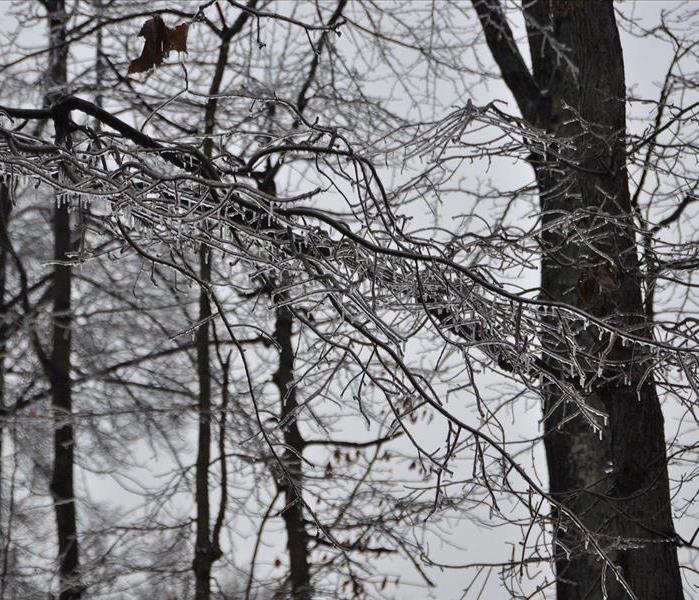 Ice covered tree limbs during a winter storm event
Ice covered tree limbs during a winter storm event
Local weather is predicting extreme cold artic air along with freezing rain throughout a large area here in the South over the next 24-48 hours. Now is the time to take precautions!
- Have a flashlight – candles and extra batteries.
- Stock up on firewood – non- perishable food and water
- Have an extra tank of propane incase you need to cook on your outside grill.
- Fill up your vehicles with gas – you made need them for heat and to charge your electronic devices.
- If you own a back up power source now is the time to test them and assure, they are safe to operate.
- Sign up for weather alerts on your smart phone and have an emergency radio on hand.
Stay safe and keep in mind Spring is around the corner!
Winter Storms and Power Outages – How to Prepare
2/3/2021 (Permalink)
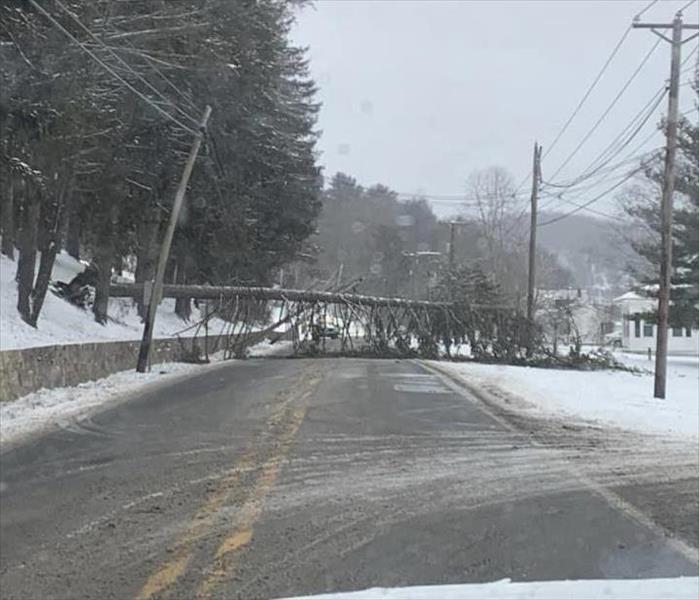 This tree fell after a winter storm causing a power outage for hours while the electric company could repair the broken lines.
This tree fell after a winter storm causing a power outage for hours while the electric company could repair the broken lines.
Winter is here and the cold temperatures throughout the South have been extremely cold and well below freezing for a few weeks – something most of us are not used too! We all prepare for the necessities like food and water – but being prepared for a power outage should be at the top of your list.
- Have flashlights ready and accessible with batteries on hand.
- Have a battery-operated radio so you can stay in tune with weather updates and alerts.
- Have a good supply of firewood on hand if you have a wood burning fireplace.
- Close off doors to bedrooms and rooms not in use and confine the family to one area of your home – make it fun like a sleepover with your friends when you were younger.
- Keep a full propane tank on hand so you can cook on a gas grill and make sure you have a manual can opener – yes this will come in handy if you have no power.
- Fill your car up with Gas – you may need your vehicle to charge your lifeline to the outside world.
- Having a generator is a plus but remember to use “generator” safety.
Following a few preparedness tips can help you and your family stay safe and warm during a power outage.
Winter Storms - Know Your Warnings
1/18/2021 (Permalink)
 A winter wonderlland among the trees
A winter wonderlland among the trees
Winter has been in effect for almost 30 days and we are all feeling the effects of the colder weather – some areas her in the South have even experienced a few snow showers. Although we haven’t experienced a winter storm yet – you need to be prepared when it happens. Knowing the difference between a Winter Storm Watch – Winter Weather Advisory and a Winter Storm Warning can help you better prepare and plan accordingly before a snowy weather event.
- Winter Weather Advisory – Current winter conditions are expected
- Winter Storm Watch - there is a potential for hazardous winter weather within the next 48 hours. Stay in tune with your local news and get preparations in place.
- Winter Strom Warning – Hazardous and potential winter weather is currently happening or will happen within 24 hours. The National Weather Service will issue a warning when snow, ice and wind damage conditions are met.
When you know what to expect – you can be better prepared when a winter storm hits.
Winter Travel - Be Prepared
12/8/2020 (Permalink)
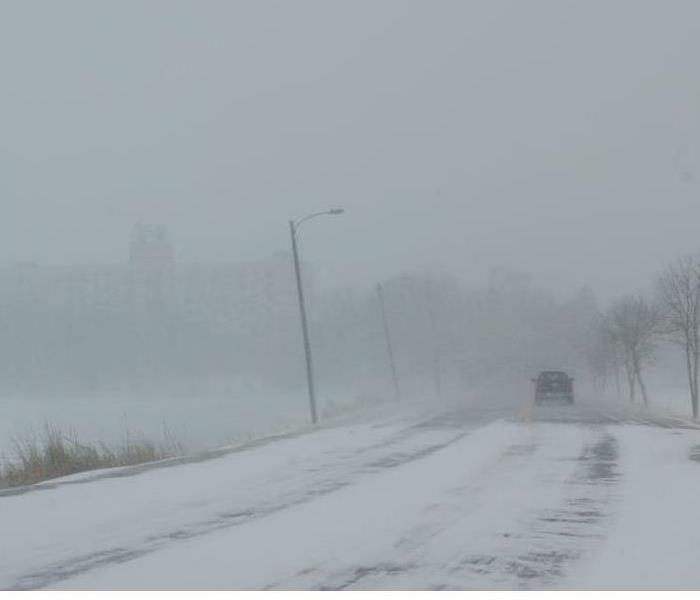 Winter covered roads
Winter covered roads
Although we usually experience mild winters here in the South you need to make sure your vehicle is prepared and ready when a winter storm hits. Now is the time to make certain your tires are properly inflated and have enough tread to be able to maneuver through snowy and slushy roads. Check your tires often during colder weather. Always keep at least a half of tank of fuel in your vehicle during the winter months in the event you get stranded on the highway due to winter weather or vehicle accidents that could delay you for hours or overnight. Keep blankets, snacks water and a cell phone charger in your car and don’t forget any medication you may need. If you are traveling a longer distance it is always best to check the weather forecast ahead of time and stay informed with weather alerts for the Department of Transportation. If you do not have to travel, then stay home and be safe!
Prepare for Winter
11/30/2020 (Permalink)
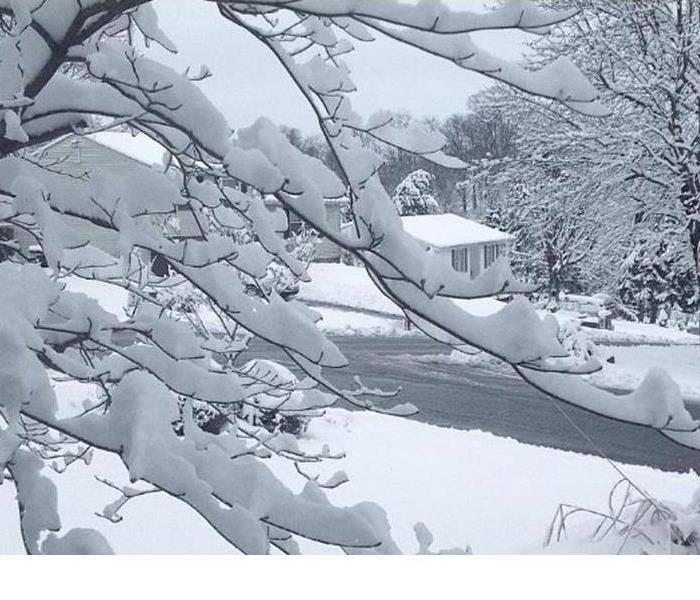 Winter Storms are upon us
Winter Storms are upon us
The Governor of South Carolina has proclaimed the week of November 29 – December 5, 2020 as Winter Weather Preparedness Week. The South Carolina Emergency Management Division and the National Weather Service along with several other agencies that work closely with these departments are encouraging the residents of South Carolina to prepare now for severe weather. Taking these precautions during milder temperatures can better prepare you for the winter weather ahead and assure you have the proper supplies to beat old man winter.
Preparing your home is very important. Protect your pipes with insulation and allow faucets to have a constant drip to avoid freezing pipes. Make sure you know where your main shut off valve is for your water source to your home and make sure you have the necessary tools to turn off the water in the event of a burst pipe. Have your chimneys inspected and cleaned by a professional before your first fire.
Getting prepared now can help you and your family when old man winter rears his cold snowy head!
Fall Storms
10/28/2020 (Permalink)
 A Fall storm moving in over the horizon
A Fall storm moving in over the horizon
When settling in for the cooler days of fall we often have the warms days and cool nights. For some this is the best time of the year but lets all remember that although the weather may be perfect – the threat for severe storms are still waiting and can strike at any time. Like in the Spring, the Fall is a changing season – temperatures clash between cold, dry, warm and humid air. This change of air mass can contribute to a severe weather and the development of storms. Staying in tune with your local weather and the potential threat of severe weather can help prepare you and your family. Check your gutters and make sure they are clear of decries and are able to maintain the heavy rainwater that may occur. Hurricane season doesn’t “officially” end until November so remain alert and prepared for the ever-changing weather.
Trees and Storm Damage
7/23/2020 (Permalink)
 Tree branches hanging over a home that could cause damage in the event of a severe storm.
Tree branches hanging over a home that could cause damage in the event of a severe storm.
We all take pride in our home and curb appeal – mature trees can bring shade, beautiful landscaping and a sense of tranquility to our homes. We work hard to maintain our landscaped homes, but one storm can blow through and do more damage than one can even fathom. Keeping your trees healthy can potentially avoid damage to your home in the event of a thunderstorm, tornado or hurricane. Keeping your trees trimmed will reduce the amount of damage that your home can incur when a storm strikes. Overhanging tree branches can fall and cause major roof damage to your home. Make sure to evaluate any branches that are weak or cracked and have them moved to avoid further damage. Grooming back dead and damaged trees can help promote better growth and keep your home safe from damage.
Safety Tips for Thunderstorms
6/24/2020 (Permalink)
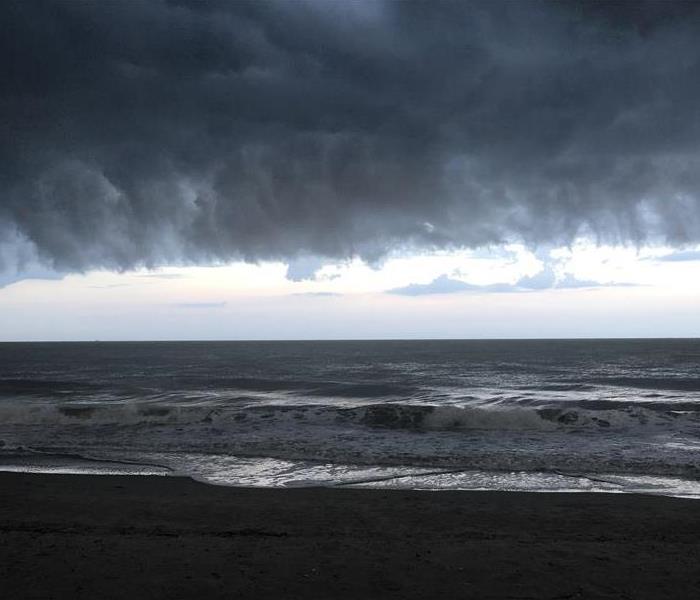 Severe storm moving inland on the coast.
Severe storm moving inland on the coast.
Its that time of year again – Sweet Summertime! Hot humid days can quickly turn into afternoon evening thunderstorms and sometimes without warning. Protecting yourself and family from the dangers of these storms can be done by following these few safety features.
Know the 30/30 rule. When you see lightening flash, start counting to thirty. If you don’t make it to thirty before hearing thunder, its time to head inside. Avoid using corded and cell phones and any electronics including computers and TV’s. Stay away from doors and windows. Do not shower, wash dishes or laundry during a thunderstorm. Electrical wires and metal pipes in plumbing can conduct lightening.
Being proactive prior to storm season can help reduce damage to your home. Remove dead or overhanging tree branches that could have the potential to cause damage to your home. Have a surge protection system in place in your home. This will help prevent lightening damage to your electronic and household items.
Storms are a part of summertime. Being educated and proactive can help you and your family stay safe!
Hurricane Season - Being Prepared
6/22/2020 (Permalink)
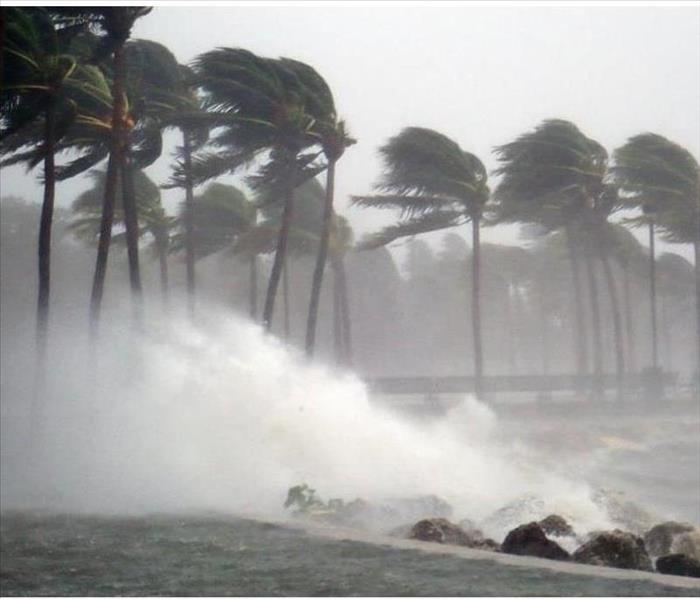 A Hurricane making landfall to the coast.
A Hurricane making landfall to the coast.
Hurricane Season is upon us and being prepared can help save you and your family stay safe. Make sure everyone in your household knows and understands your hurricane plan and your evacuation route in the event a Hurricane is predicted in your area. Paying close attention to local weather reports can help you better prepare before the storm. Make sure you have the supplies on hand to secure your home prior to an evacuation. Protecting your windows with plywood boards or storms shutters can help reduce extensive damage. Secure outside furniture and objects that could cause further damage during a hurricane. Have food, water, a first aid kit, cash, and medical prescriptions on hand. Being called to evacuate can come quickly if you live near the coast or in low lying areas. Being prepared and ready to go can make it easier on you and your family.
Severe Weather Alerts
2/5/2020 (Permalink)
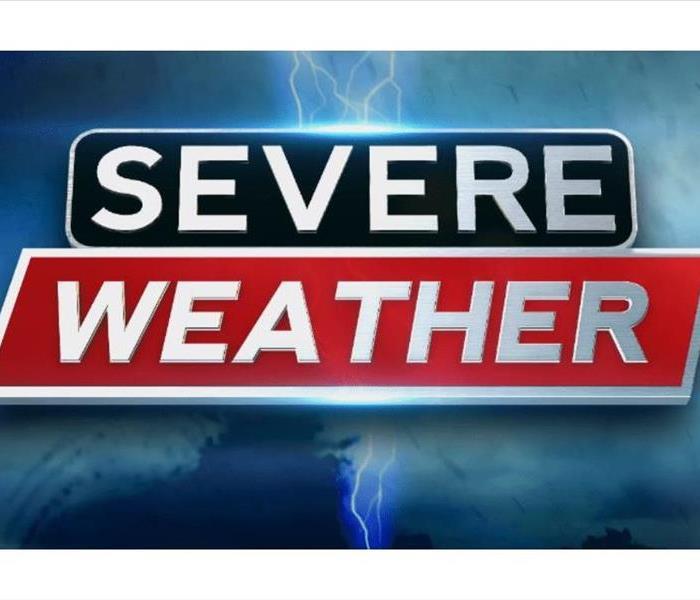 Severe Weather Alert - Know the difference
Severe Weather Alert - Know the difference
Knowing the difference between a storm warning and a storm watch can help you prepare for the threat of a severe storm that may impact your area. A Severe Storm Watch simply means to be prepared that a possible severe storm is probable, and you need to be prepared early. A Severe Storm Warning simply means take action that a storm has been confirmed and could indicate an imminent danger to life or your property. Take shelter is a substantial building and if you live in a mobile home do not stay in the dwelling. High winds can overturn the home quickly. Always stay tuned to your local weather outlets for updated weather conditions – Stay safe and know that SERVPRO of Newberry and Laurens Counties is here if you need us!
Winter Storm Travel
12/9/2019 (Permalink)
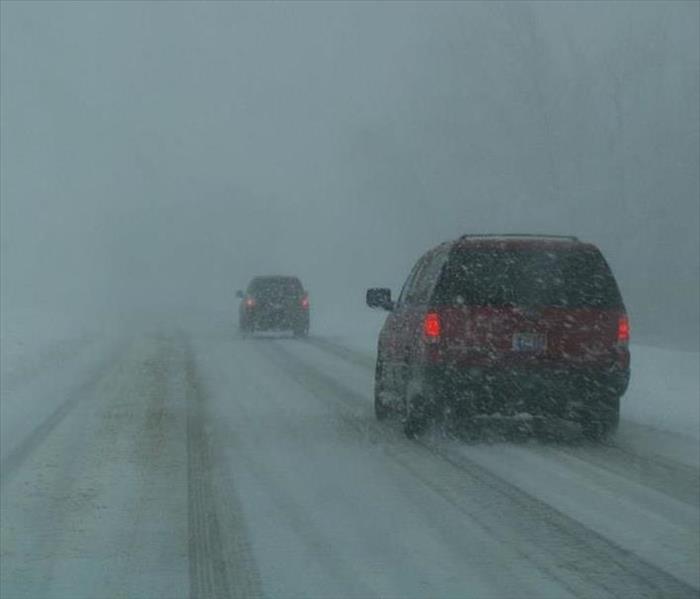 Motorist traveling during a winter storm with snowy road conditions.
Motorist traveling during a winter storm with snowy road conditions.
Winter is approaching quicker than we think so make sure your vehicle is prepared when a winter storm hits. Now is the time to make certain your tires are properly inflated and have enough tread to be able to maneuver through snowy and slushy roads. Check your tires often during colder weather. Always keep at least a half of tank of fuel in your vehicle during the winter months. You will be glad you did in the event you get stranded on the highway due to a winter storm and vehicle accidents that could delay you for hours and even overnight. Keep blankets, ice scraper, snacks, water, cell phone chargers and any medication you may need. –This is very important during longer traveling trips. Remember the weather can change quickly – stay informed with local weather alerts and your local (DOT) Department of Transportation alerts. Be safe and if you don’t have to travel – Don’t!
Winter Storm Preparedness
12/4/2019 (Permalink)
 Winter Storm of a home
Winter Storm of a home
Throughout the US most states have proclaimed the week of December 2 through December 8th as Winter Preparedness Week. State agencies along with the National Weather Service encourages everyone to prepare for severe winter by checking supplies and safety plans before the real weather hits.
Residents should prepare for winter weather now during the milder temperatures while winter emergency supplies are in low demand. Shovels, battery-powered radio, extra batteries, water and nonperishable foods should be a part of your household emergency kit. Insulate pipes and allow faucets to drip a little during freeze warnings. This will prevent any busted pipes and water damage to your home. Chimneys should be cleaned and inspected by a qualified professional prior to burning any fires in your fireplace. Chimneys can be filled with highly flammable layers of creosote so having your fireplace inspected is imperative to avoid a potential house fire.
Being prepared can save you and your family from any unneeded stress over the cold winter months.
Peak Hurricane Season- Are You Prepared?!
9/4/2019 (Permalink)
 The Eye of Hurricane Dorian - heading towards the mainland of the United States
The Eye of Hurricane Dorian - heading towards the mainland of the United States
Although Hurricane season began June 1 we are now in peak season of the potential of a Hurricane. As we are all watching Hurricane Dorian slide up the coast and praying for all those in his path – we need to all be reminded that being prepared is the best way you can ride the storm out.
Plan your evacuation route and pay close attention to news sources and local government officials. Check locations of the nearest shelters and make sure if you have pets, they will be welcome.
Keep non-perishable emergency supplies on hand – don’t wait for the warning pick up a few supplies each time you do your weekly shopping. Keep a supply of batteries, candles, supplies to protect your home, drinking water, first aid kit and food items that do not need to be cooked or kept refrigerated.
Review your insurance policies and make sure you keep copies of your policy with you. Take all necessary steps to protect your home. Cover windows and glass doors and make sure all weak branches are cut to avoid any further damage to your home.
Most importantly keep your family safe and know you can count on SERVPRO of Newberry and Laurens Counties to be there for you!
Are You Tornado Ready –
7/9/2019 (Permalink)
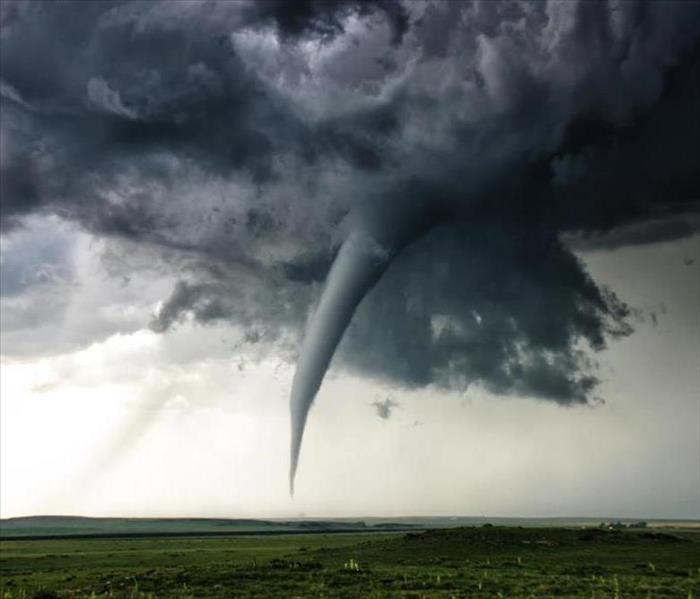 Tornado
Tornado
Tornadoes can be a devastating act of nature. These storms can reach winds of 300 mph and can level homes, business and entire towns in within minutes. Your best defense is to be ready and know what to do if a tornado should strike. Discuss a plan with your family and practice it. Set up a means of communication and make sure each family member stays in contact with each other and know the closest evacuation center. Make sure you have an emergency kit that includes food, water and medical supplies in the event of injuries. Stay informed – pay close attention to weather alerts - it’s always a good idea to have a weather radio on hand. The most important is to find shelter – if you are in a structure, find the most interior room of your home and stay away from windows and doors. Put as many walls as possible between you and the storm. Following these safety tips can help protect you and your family in the event a Tornado should strike.
Summer Thunderstorms – Safety Tips and Preparedness
7/1/2019 (Permalink)
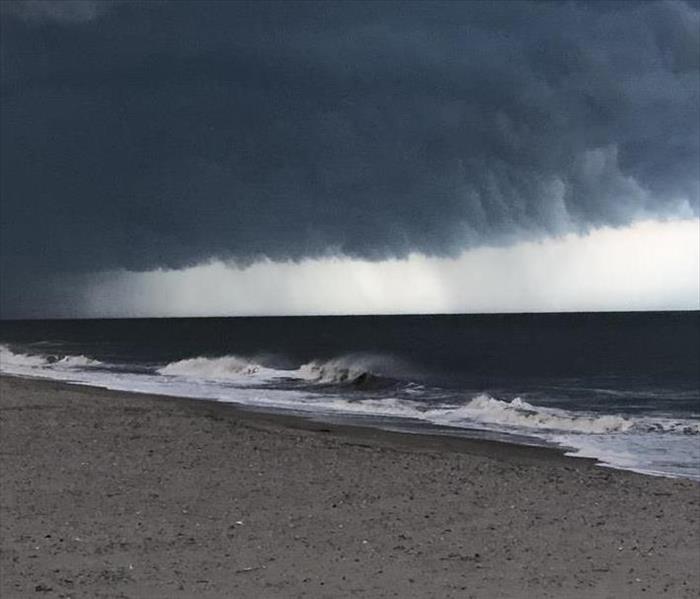 Summer Storms
Summer Storms
Summertime thunderstorms can come out of know where and sometimes with very little warning but there are a few things you can do to prepare yourself and your family when one hits. Keep an eye on the sky and have weather alerts activated on your phone. Find a sturdy building or your car and stay away from trees and powerlines. If you’re in a group stay about 15 feet away from each other. Stay out of water so if you’re enjoying a swim in the pool get out as water is a great conductor of electricity. If you are inside the same rules apply – do not shower or take a bath – avoid water all together. Stay away from windows and doors and avoid using electric equipment like your computer or appliances.
Thunderstorms are a part of summer – so be extra aware of the weather and stay safe!
Storm Preparedness- How you can be ready!
5/29/2019 (Permalink)
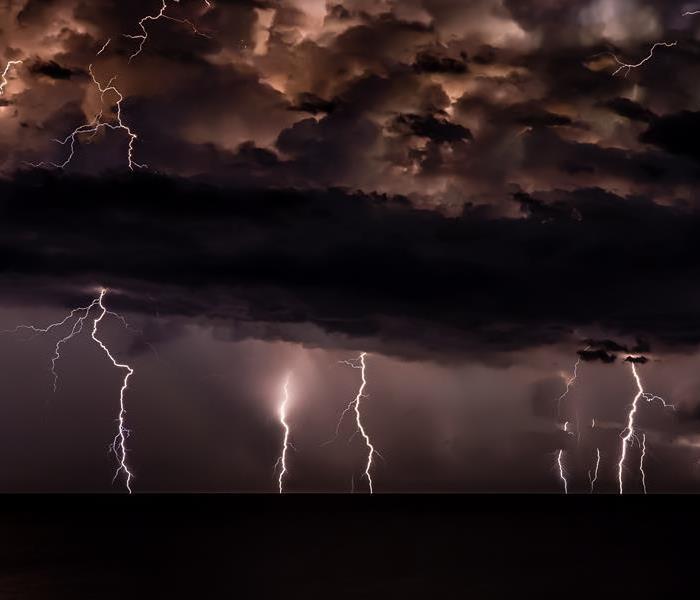 Nature brings Storms!
Nature brings Storms!
As hurricane season is slowing approaching and the warms days of summer have already started here in the South – we must get prepared for severe storms. Although our area rarely gets hit with a full-blown hurricane the remnants of a costal hurricane can significantly affect us. The best line of defense is to be prepared.
Protect your property. Cover windows with tape and keep your blinds closed. Secure outdoor items by moving them into a shed or garage or basement. Park cars on higher ground and away from trees. Stock up on essentials buy building an emergency kit to keep in your home and be sure to have an emergency kit available for any injuries. Make sure your phone is charged and you have an external battery back up in case your power is out. It’s also a good idea to have an analog phone if you currently have a LAN line in your home. This will allow communication in the event cell service is lost. Have some extra cash on hand. power outages mean no ATMS or banks are operating. Make sure to have nonperishable foods (don’t forget the manual can opener) and water on hand.
Simple preparedness is key to riding out a major storm. Stay safe and know that you can count on SERVPRO of Newberry and Laurens Counties to be there for you!
Southern Homes Particularly Vulnerable During Cold Temperatures
1/17/2018 (Permalink)
For those of us south of the Mason Dixon line we count on traditionally mild winters. Houses are often built on slab foundations and frequently have water pipes running through the attic, an especially vulnerable location.
Southern homeowners should be aware that pipes in attics, crawl spaces and outside walls are all subject to freezing and bursting. If these pipes don’t have insulation or heat to protect them, a strong overnight freeze can cause trouble.
Homeowners in the south need to be alert to the damages of freezing and bursting water pipes when the outdoor temperature threatens to drop to 20 degrees Fahrenheit. Although 20 degrees Fahrenheit is well below the freezing temperature of water, two factors make this the critical outdoor temperature:
- The temperature of an unheated portion of a house is almost always at least a few degrees above the outdoor temperature.
For example, an insulated attic may be at 37 degrees or 38 degrees Fahrenheit when the outdoor temperature is 32 degrees Fahrenheit.
- Water “supercools” several degrees below freezing before any ice begins to form.
In research tests at the University of Illinois, water pipes placed in an unheated, insulated attic consistently started forming ice when the outdoor temperature dipped just below 20 degrees Fahrenheit.
The 20 degrees Fahrenheit threshold is primarily for homes in the south and other areas where freezing may occur only once or twice a season.
These suggestions for homeowners in southern states will help them prevent freezing pipe damage:
- Pipes in attics and crawl spaces should be protected with insulation or heat. Pipe insulation is available in fiberglass or foam sleeves. Home centers and hardware stores have sleeves providing one-eighth-of-an-inch to five-eighths-of an inch of insulation; specialty dealers have products that provide up to two inches of insulation. (Check the Yellow Pages under “Insulation” or “Plumbing Supplies” for sources.)
- Heating cables and tapes are effective in freeze protection. Select a heating cable with the Underwriters Laboratories label and a built-in thermostat that turns the heat on when needed (without a thermostat, the cable has to be plugged in each time and might be forgotten). Follow the manufacturer’s instructions closely.
- Doors on cabinets under kitchen and bathroom sinks should be left open during cold spells to allow the warmer air of the room to circulate around the pipes.
- Exterior pipes should be drained or enclosed in two-inch fiberglass insulation sleeves.
- Pipes leading to the exterior should be shut off and drained at the start of the winter. If these exterior faucets do not have a shut-off valve inside the house, have one installed by a plumber.
- Hoses should be removed and stored inside during the winter.
- Let faucets drip slowly to keep water flowing through pipes that are vulnerable to freezing. Ice might still form in the pipes, but an open faucet allows water to escape before the pressure builds to where a pipe can burst. If the dripping stops, it may mean that ice is blocking the pipe; keep the faucet open, since the pipe still needs pressure relief.
Information contains in this blog was provided with the help of our friends at Farm Bureau Insurance.
If you should need assistance your friends at SERVPRO are here to help.
Tornado Basics
10/23/2017 (Permalink)
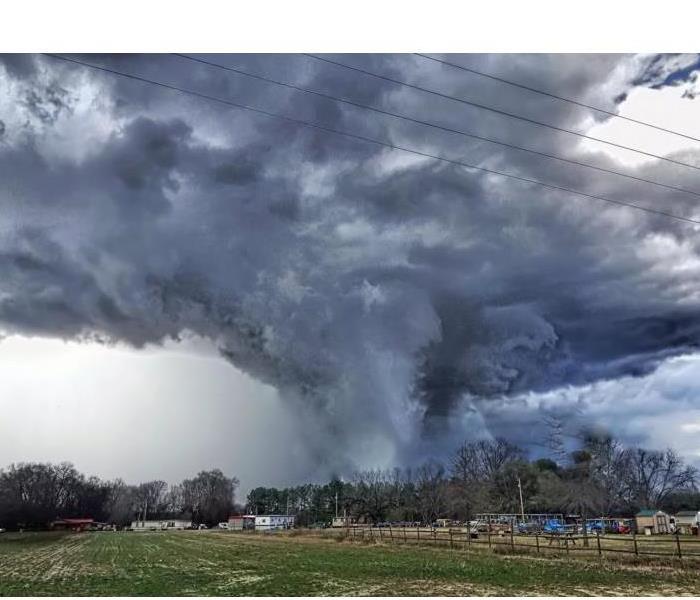 Strong winds also came with tornado warnings in Cheraw. Chris Jackson took this photo in Chesterfield County.
Strong winds also came with tornado warnings in Cheraw. Chris Jackson took this photo in Chesterfield County.
Tornado Basics
Tornadoes have caused a lot of destruction in many towns across the United States. South Carolina averages 14 tornadoes per year, resulting in an average of 1 fatalities. Counties in a high risk tornado area include Bamberg County, SC, Saluda County, SC and Richland County, SC. The largest tornado on record occurred on 04/08/1957, measuring a 4 on the Fujita-Pearson scale. Although, we cannot prevent a tornado, we can be more knowledgeable of what a tornado is and the signs of a tornado coming.
Tornadoes are considered nature’s most fierce storms and is formed from a violently narrow rotating column of air that extends from the base of a thunderstorm to the ground. Before a tornado hits, the wind may die down and the air may become very still. A tornadoes location may be marked by a cloud of debris even if the funnel is not visible.
Tornadoes may cause devastating fatalities and damage to many homes and neighborhoods in the matter of seconds.
According to the National Severe Storms Laboratory (NSSL), “About 1,200 tornadoes hit the U.S yearly.”
Tornadoes are most likely to be seen during May into early June for the Southern Plains and for the Northern plains and upper Midwest, tornadoes are more likely to be seen in June or July. Although, these are the peak tornado seasons, tornadoes can happen at any time of the year. Tornadoes can also happen at any time of the day or night, but are most likely to hit between 4-9 p.m.
Key Terms:
Tornado Watch: the conditions are favorable for a tornado.
Tornado Warning: a tornado has been reported, you should seek shelter.
Air Pressure: is the weight of a column of air that extends from the ground to the top of the atmosphere.
Funnel Cloud: a rotating column of wind that has not touched the ground (funnel clouds are called tornadoes when they reach the ground).
Multi-Vortex Tornado: a tornado that has two or more vortices that circle the center of a larger tornado.
Tornado Alley: an area in the United States where tornadoes are more likely to develop.
For more information on tornado safety and what to do in case of a tornado please visit https://www.weather.gov/ctp/TornadoSafety .



 24/7 Emergency Service
24/7 Emergency Service






































